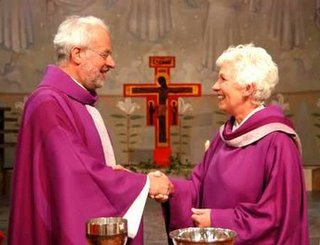Spannende positie van een Joodse vrouw ten voordele van het Latijn!
Latin's second coming
Barbara Kay, National Post
Published: Wednesday, October 18, 2006
It would appear that Pope Benedict XVI intends to reinvigorate the beleaguered (Tridentine) Latin mass, which in the late '60s was almost universally replaced by individual vernacular languages to encourage "active participation" for ordinary parishioners. Although not a stakeholder in the issue, I am all in favour of Latin's second coming.
Last month, my friend Monique, an Opus Dei numerary, honoured me with an invitation to attend a traditional private mass presided over by Bishop Javier Echevarria, the visiting Opus Dei prelate. I'm one of those academic fossils who actually majored in Latin in university, so the sonorous majesty of the recitations provided me with a fillip of cultural nostalgia I could not have experienced anywhere else these days.
Monique closed the liturgical loop last Saturday by accompanying me for her first-ever visit to a synagogue. Although she didn't understand a word of the almost all-Hebrew service, she declared herself aesthetically pleased, and the prayers meaningful for their historical associations with Christianity.
After a lifetime of sometimes more, sometimes less frequent attendance at synagogue, I negotiate the Hebrew service with casual familiarity, for the same motifs recur again and again. But since I don't speak vernacular Hebrew, my vocabulary remains frozen at the "See Spot run" level. So, ironically, even though I am a fluent reader and chanter of my own liturgy, I actually grasped more of the literal meaning in the Opus Dei mass than I do in my own Hebrew prayers. Nevertheless, the Catholic mass, Latin or otherwise, will never be anything but an aesthetic experience for me, while my imperfectly understood Hebrew meets all my spiritual needs.
For the power of liturgy to lift us out of our narrow practical and material pursuits is not dependent on our understanding of every actual word we are saying, any more than our emotional submission to classical music's soaring magic is dependent on our ability to read the score that produced it. The power of liturgy to stir and inspire us isn't even dependent on our commitment to the beliefs and doctrines from which the liturgy sprang.
I see the worship service as more about belonging than belief. An ancestral, globally employed language like Hebrew or Latin provides a context for predictable and organic communion amongst those present at the service. Through regular engagement, even though rote, with a universally recognized language, worshippers are subliminally imbued with a common motivational narrative from the past, common moral goals in the present and intimations of a common destiny in the future.
But the ancient language and music of the liturgy, which unite the individual with his fellows in the sanctuary's space, also unite the individual with the eternal idea of peoplehood -- those who came before and who will come after -- in time. Under the mesmeric sway of ancestral language, the finite moment is transcended through expressions of aspirational yearning (future), emotional attentiveness (present) and nostalgia (past) to fuse in what the philosopher Henri Bergson called "intentional time," when the worshipper achieves the spiritual peace that is conferred by timelessness.
Last Saturday was my father's yahrzeit, the anniversary of his death. I spoke aloud the ancient Hebrew words of the mourners' kaddish, as my English/Yiddish-speaking father did for his father, and his Polish/Yiddish-speaking father and forefathers before him for theirs. Declaiming it in English would have no heritage meaning for me. It is a comfort to know that I could have walked into any synagogue in the world on any Sabbath, recited the same prayer, and experienced the same sense of peoplehood as I do here. In the 1960s, the received wisdom amongst ascendant secular humanists taught that all traditional, hierarchical institutions were intrinsically corrupt, and only an induced cultural amnesia would suffice to level the playing field. Even the Vatican was not immune to the force of the zeitgeist. But making the mass egalitarian, and literally more accessible through the use of vernacular, did not bring more people to the Church, in North America at any rate.
Reform Judaism once tried to phase out Hebrew in the interest of "active participation." The services were "accessible" but sterile and deracinating, and now Hebrew is back in the Reform liturgy. Quod erat demonstrandum. Bring back the Latin mass.








